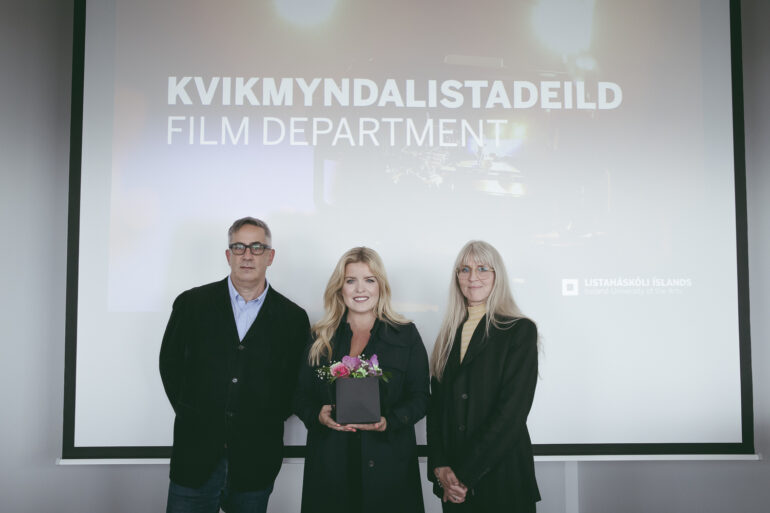WRITTEN BY: Annika Pham
After a decade of lobbying, Iceland will be able to train its rising talents at home, with tutors including Ragnar Bragason, Ása Helga Hjörleifsdóttir among others.
Many of today’s rising voices from Iceland moved abroad to do a BA or MA diploma in filmmaking. Oskar Kristinn Vignisson (Free Men), Hlynur Pálmason (Godland), Katrin Björgvindsdóttir (Trapped) graduated from the National Film School of Denmark.
Others such as Ugla Hauksdóttir (Hanna, Trapped) and Isold Uggadóttir (And Breathe Normally), attended New-York’s Columbia University of the Arts, while Thordur Palsson (The Valhalla Murders) studied at the National Film & Television School in the UK.
From now on, the next generation of Icelandic filmmakers will be able to stay at home to do a BA in film at Iceland’s University of the Arts (IUA).
The first cohort of 12 students – 6 male -6 female - some with prior film experience, have had their first full week of courses at IUA, which also offers courses in architecture, arts education, design, fine arts, music, and performance arts.
This major breakthrough in film education in Iceland, comes after a decade of lobbying from the industry and has been enabled by the current Minister of Education and Culture, Lilja D. Alfreðsdóttir as part her comprehensive Film Paper ‘Film Policy Until 2030’ - separate story: CLICK HERE.
“The aim of the programme is to create the next generations of Icelandic film authors, and to provide emerging talent the opportunity to study domestically instead of abroad,” explains US-born Steven Meyers, former film consultant at the Icelandic Film Centre and now Head of the Film Department. “Also, being in a university environment here connects us to partner institutions abroad, through regional and international networks, and through the possibilities of student and teacher mobility. This opens the world to our students, and brings them all kinds of possibilities they’ve never had before,” he notes.
According to Meyers, the three-year BA programme follows the Bologna model. The first year covers the fundamentals in directing, screenwriting, producing and the technical disciplines (editing, cinematography, sound design). The second year, students make two short films (fiction and non-fiction) and the third year, they complete a research project and a practical graduation project, depending on their chosen discipline. They finally graduate with a B.A. in their favoured specialty.
Meyers (a former graduate from N.Y.’s Columbia University) says defining the curriculum was a long process. “Our curriculum is closer to the N.Y., Gothenburg or Stockholm film school models. We are a small community, with only 12 students, so we can’t work across separate departments. The first thing we worked on was to create something small, intimate, rigorous, with a collective experience, at least for the first couple of years,” said Meyers who stresses that most classes are delivered in the Icelandic language.
The teaching and supervising team consist of professionals and academics. This first semester, Ragnar Bragason (Children, Metalhead) and Ása Helga Hjörleifsdóttir (The Swan, Letter from Helga) will be teaching directing, Steven Meyers and Fridrik Erlingsson (Ploey: You Never Fly Alone) screenwriting; US-born Tanya Sleiman will teach producing; Gudrún Elsa Bragadóttir, history and theory, Birgit Gudjónsdóttir, cinematography, while Erlendur Sveinsson will serve as coordinator of technical disciplines.
Meyers says the next goal will be to establish an MA in filmmaking.
Commenting on the new BA in filmmaking, Laufey Guðjónsdóttir, Head of the Icelandic Film Centre said: "Most of our filmmakers are educated abroad, which has also built up their professional international network. But it's great for the film community to get a new formal educational platform where people can share their experience and knowledge with new generations of filmmakers."
Producer Grimar Jonsson (RAMS, Under the Tree), founder and CEO at Netop Films added: "It's a huge step for us to have a proper University level film education and it's taken over a decade to reach that goal. When it comes to education, filmmaking has been undervalued as an art form in our culture. Now Iceland University of the Arts finally covers all the academic fields for the greater good of students, teachers in all departments and the creative industries in Iceland as a whole.“
